Article /
Framework for needs-informed research: assessing climate processes
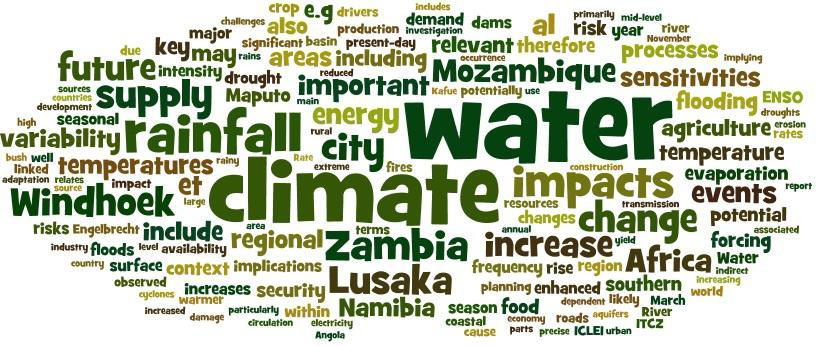
Introduction
FRACTAL aims to improve understanding of regional climate processes and process change in Southern Africa, whilst taking into account the urban decision context and research to improve understanding of how cities can become more climate-resilient.
This document presents a framework for needs-informed research targeted at understanding the climate processes driving the African regional climate system’s natural variability and response to global change in recorded history and climate model simulations. You can access examples of improved climate models developed as part of FRACTAL here:
- IMPALA: Improving Model Processes For African Climate
- HyCRISTAL; Integrating Hydro-Climate Science into Policy Decisions
- AMMA 2050: African Monsoon Multidisciplinary Analysis 2050
We outline parallel top-down and bottom-up characterisations of climate processes, where each provides an alternative starting point to pursue needs-informed research. Through this parallel approach it is possible to identify key climate processes relevant to Southern Africa and identify scientific knowledge gaps for each city within the context of both present-day variability and future climate change.
*Download the full document from the right hand column. The key messages from the report are provided below. See the full text for much more detail.
Top-down View of Processes
Needs-informed research is focused on addressing foundational knowledge gaps and developing new methodologies to better understand climate processes and process change relevant to Southern Africa, requiring only minimal framing from users.
To provide a starting point to pursue needs informed research, a top-down approach begins by compiling current understanding of the dominant synoptic scale climate processes in the region as well as relevant remote processes and “process chains” that extend beyond the southern African region.
The diagram below (Figure 1) summarises a top-down approach for research to understand climate processes, showing the sequence of steps required to characterise and analyse relevant climate processes and “process chains” that acknowledge the interplay of multiple processes across time and space.
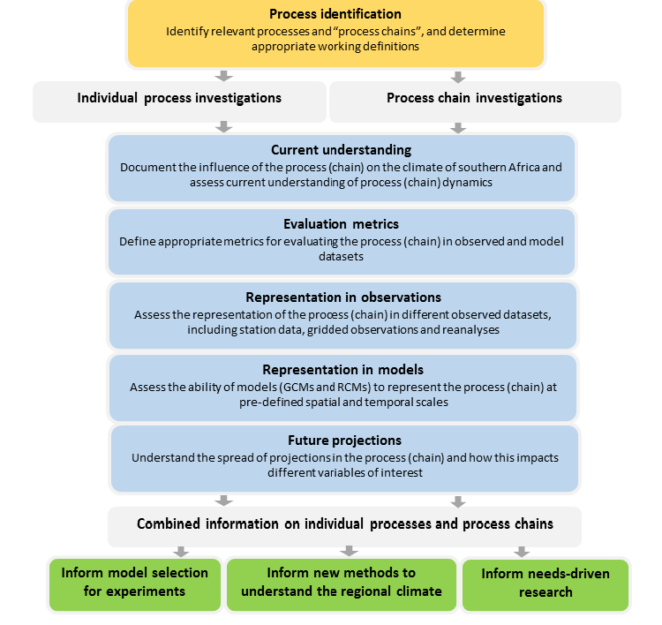
Identification of key processes for the focus region
Climate processes in the region vary across temporal and spatial scales, and include both local and remote processes. Some of the key large-scale processes known to affect the climate of southern Africa include: migration of the Inter-tropical Convergence Zone (ITCZ); Regional Hadley circulation; and the El Nino Southern Oscillation (ENSO).
Key steps for investigating individual processes:
- Compile and document current understanding: details of the dynamics of the process; its behaviour across temporal and spatial scales; and how the process is thought to impact the climate in southern Africa under current forcing and possible future conditions.
- Determine appropriate evaluation criteria or “metrics”: defining and testing a range of metrics may be necessary.
- Assess the representation of a process in observations: for processes that are defined using multiple variables and/or over different geographical regions, the assessment may need to consider the representation of the process simultaneously across multiple datasets.
- Assess the ability of models to represent the process:Climate models inherently contain biases in the representation of climate processes and variables. Understanding the biases is an important precursor for assessing future projections of changes to climate processes.
- Analyse available climate model projections: compare information from multiple models and methods to determine whether or not different methods and models provide consistent information or whether there are systematic biases (see Figure 2 below).
- Compile information: Document and compare different individual climate processes relevant.
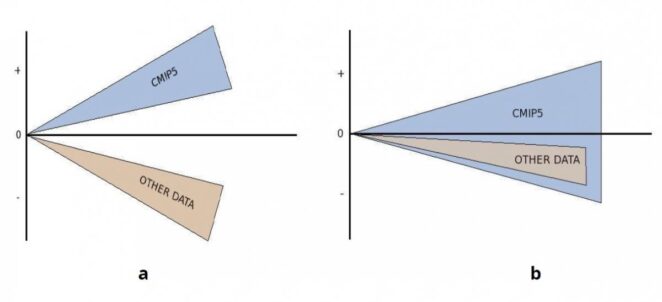
Undertaking process chain investigations:
A process chain is a sequence of at least three atmosphere and/or ocean processes that results in a weather or climate outcome, where each individual process has a discernible physical influence on (or is influenced by) an upstream/downstream process (FRACTAL working definition). The example below (Figure 3) serves to demonstrate that this outcome results from a number of upstream processes.
Once a process chain has been identified, the same steps outlined in the conceptual framework can be used to quantify the nature of the process chain in observations, models and future projections.
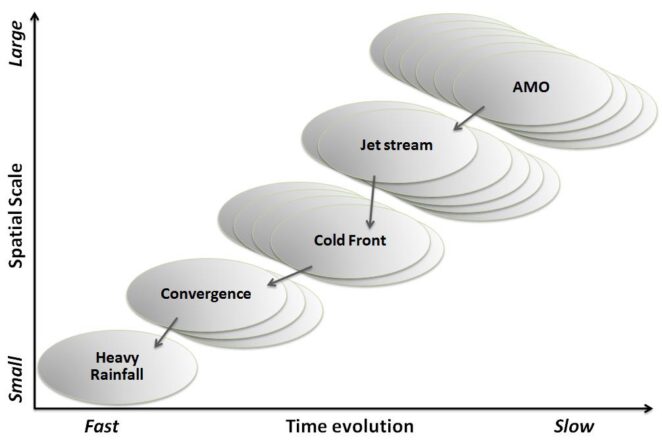
Informing future research activities:
Inform model selection for experiments: Prior to addressing explicit user needs it is possible to determine which GCMs are suitable for downscaling based on assessments of their performance and the range of future projection uncertainty. Whilst there are different methods of selecting models for downscaing, the approach being suggested for FRACTAL is based on two step process as outlined in McSweeney et al (2015a). This approach emphasises removing models that produce unreliable simulations rather than selecting the “best” models, since all models are imperfect and different evaluation methods will reveal different models as being better than others. For the remaining models, the approach seeks to remove models that cannot capture relevant processes of interest and and/or do not span the uncertainty range associated with future climate projections needed for adaptation decision making.
Informing new methods to understand the regional climate: Research conducted on individual processes and process chains has broader relevance to the climate research community across the world and as such, should explore and test new methodologies that advance ways of understanding climate processes driving the African regional climate system’s natural variability and response to global change.
Entry points for needs-driven research: The understanding of the urban context is still emerging through project interactions in the focus cities. Through engagement in the cities it is important to establish a clear articulation of what we know, don’t know, and could know about relevant aspects of climate variability and change over Southern Africa, and the climate processes responsible. High probability climate entry points for engaging in needs-driven research include basin/catchment scale rainfall (and temperature/evaporation) characteristics; wind extremes driving coastal storm surge; and combined extremes (rainfall and wind, rainfall and cold, dry and hot), amongst others (see full text for a longer list).
This framework was produced at an early stage of the FRACTAL project and more recent research builds on this work, see Climate process chains: examples from Southern Africa.
Bottom-up View of Processes
To provide an alternative starting point to pursue needs informed research, a bottom-up approach begins with an articulation of key climate risks facing the cities of interest. It uses existing knowledge and preliminary assessment, and relating these to relevant climate processes that influence these risks. Through understanding the climate risks and sensitivities of adaptation decisions, it is then possible to identify which climate processes are most relevant and therefore warrant further investigation within the needs-informed research stream.
In FRACTAL this was done using the ‘City Learning Labs’ approach.
The working paper presents the weather, climate context, city context and sensitivity to climate risks of Maputo, Windhoek and Lusaka. The discussion of climate risks and key impacts is based on analysis of the “city background reports” produced at the beginning of the FRACTAL project.
Key risks facing the cities:
- Maputo: tropical cyclones; rainfall variability and change; temperature increases; sea-level rise and coastal erosion; contaminated and decreased water resources; loss of biodiversity, ecosystems, natural and marine resources.
- Windhoek: increasing temperatures and evaporation; rainfall variability and change; changes in wind and solar insolation.
- Lusaka: flooding; increasing temperatures and evaporation; rainfall variability and change; wildfire; malaria prevalence.
Linking Top-down and Bottom-up Perspectives
In connecting the top-down and bottom-up perspectives, it is possible to determine which processes and process chains are relevant to each city, given the climate risks that each city faces. An example of this from FRACTAL is shown below.
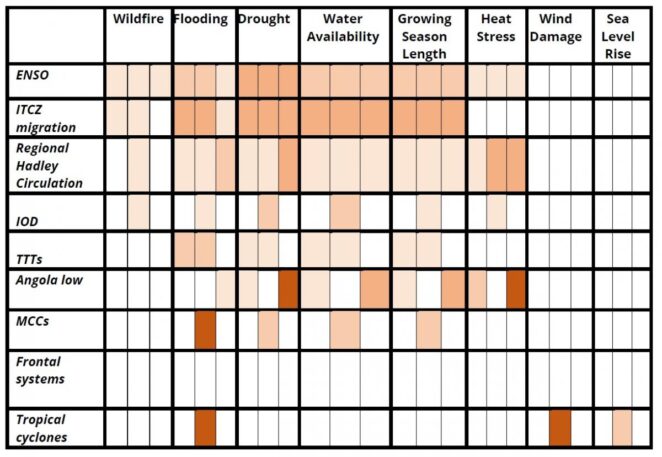
Conclusions
FRACTAL aims to advance the understanding of the regional climate system in southern Africa and improve methods for analysing climate data to deal with uncertainties. This framework document provides a basis for undertaking needs-informed research activities using a common framework to ensure that the science remains coherent while attempting novel approaches.
This framework:
- provides a starting point to pursue needs-informed research.
- can be used to anchor research taken by different institutions in the climate information cluster.
- informs the development of approaches and metrics to undertake model assessment.
- The framework is of direct value to the different cities in terms of understanding uncertainties and guiding decision making.
Authors
This working paper was written by
- Joseph Daron Science Manager, International Climate Services, Met Office, Exeter, United Kingdom
- Tamara Janes Scientist, Climate Information for International Development, Met Office, Exeter, United Kingdom
- Chris Jack Principal Researcher, Climate System Analysis Group, University of Cape Town, Cape Town, South Africa
- Richard Jones Science Fellow, Met Office, Exeter, United Kingdom
Suggested citation
Future Resilience of African CiTies and Lands (2016) TFramework for needs-informed research: assessing climate processes. Future Resilience of African CiTies and Lands: Cape Town, South Africa.
- FRACTAL project website
- FRACTAL: Future Resilience for African Cities and Lands
- Climate process chains: examples from Southern Africa
- Co-producing climate knowledge – Great in theory, but how about practice?
- Africa's Climate: Helping decision-makers make sense of climate information
- IMPALA: Improving Model Processes For African Climate
- HyCRISTAL: Integrating Hydro-Climate Science Into Policy Decisions For Climate-Resilient Infrastructure and Livelihoods in East
- AMMA 2050: African Monsoon Multidisciplinary Analysis 2050
